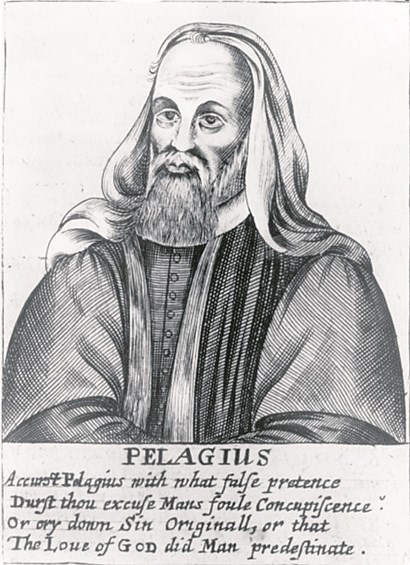Christian History Fact

Pelagianism is named after Pelagius, a British monk who lived in the late 300s and early 400s AD.
Pelagianism contends that humans are born neutral towards sin and prompted a school of thought that denied several fundamental Christian doctrines including original sin, the fall of man, salvation by grace, predestination, and the sovereignty of God.
Pelagianism is considered heresy because it departs from essential biblical truth in several of its teachings. Pelagianism asserts that Adam’s sin affected him alone.
The Bible states that when Adam sinned, sin entered the world and brought death and condemnation to everyone, “for everyone sinned” (Romans 5:12-21,).
Often, progressive Christians teach that our sin isn’t what separates us from God, but it’s our shame that makes us feel separated from him.
In the modern day advocates present liberal Christian– ity as something new and revolutionary, it is nothing of the sort. It may have new names (e.g., “emerging” or “progressive” Christianity), but it is simply a rehash of the same well-worn system that has been around for generations. Liberal Christianity is called progressive Christianity. It’s a version of Christianity that sells itself as a valid option for Christians that on the surface looks a lot like the Christian worldview and may seem in the eyes of many people to be more acceptable, more likable, a really more palatable version of the faith.
Often, progressive Christians teach that our sin isn’t what separates us from God, but it’s our shame that makes us feel separated from him. This is what Richard Rohr refers to as the “small self.” He teaches that mature faith is practiced by finding the “True Self,” and learning to “consciously abide in union with the Presence within us.”
According to progressive Christianity, sin doesn’t separate us from God. We just need to understand how loved and good we already are. This idea is antithetical to Scripture and runs contrary to what we experience in our fallen world.
We can see how Pelagianism survived as one of many building blocks that shaped today’s progressive Christianity worldview on sin and the nature of men.
RESPONSE: A Christian worldview and human sinfulness
The wicked are estranged from the womb; they go astray from birth, speaking lies.
~ Psalms58:3
Surely there is not a righteous man on earth who does good and never sins.
~ Ecclesiastes7:20
If we say we have not sinned, we make him a liar, and his word is not in us.
~ 1 John 1:10
Who can bring a clean thing out of an unclean?
~ Job 14:4
There is not one. If we say we have no sin, we deceive ourselves, and the truth is not in us.
~ 1 John 1:8
Christianity teaches that everyone is equally prone to sin and so it focuses not only on human behavior, but also on human nature. In his letter to the Romans, Paul wrote that “there is no difference, for all have sinned and come short of the glory of God” (Romans 3:22-23).
Even though there can be a considerable scale of wrongdoing in sinful human activity, a person’s sin does not make him or her less valued by God; everyone is equally a candidate for redemption. Redemption (pronounced ree DEMP shun) is the act of buying something back or paying a price or ransom to return something to your possession.
Redemption means Jesus Christ, through his sacrificial death, purchased believers (Everyone… Romans 10:13) from the slavery of sin to set us free from that bondage.
“Whoever calls on the name of the Lord shall be saved”
~ Romans 10:13
We were slaves to sin, condemned to eternal separation from God. Jesus paid the price to redeem us, resulting in our freedom from slavery to sin and our rescue from the eternal consequences of that sin.
Put simply, liberal Christianity is not Christianity.
DR. MICHAEL J. KRUGER
REFERENCES & RESOURCES
The Ten Commandments of Progressive Christianity – MICHAEL J. KRUGER
131 Christians Everyone Should Know (p. 23).
“Pelagius.” Who’s Who in Christian history (p. 547).
Pocket Dictionary of Church History: Over 300 Terms Clearly and Concisely Defined (p. 112).
“Pelagianism.” The Lexham Bible Dictionary.
Christian History Magazine-Issue 51: Heresy in the Early Church.
Basic Theology: A Popular Systematic Guide to Understanding Biblical Truth (pp. 254–255).





